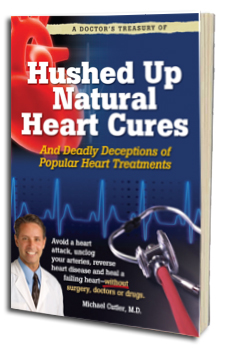Dear Friend and Subscriber, 
The first medication to control high blood pressure was called sodium thiocyanate, created back in 1900. It's actually a compound mixture of salts and cyanide. It was found to dramatically reduce blood pressure, but also came with a price - life threatening side effects.
Today, over 50,000 Americans die every year because of hypertension (high blood pressure). And now, more than ever, high blood pressure medications are being doled out to us like children touring a candy factory. These meds appear to have come a long way since 1900...but have they?
Not cyanide, but...
It's a drug called Nitropress® . It's a far removed cousin of the old sodium thiocyanate. And it too has been shown to significantly lower blood pressure...
But some of the side effects of this injection drug are:
- Confusion and tinnitus (ringing in the ears)
- Gasping for a breath - or breathing that stops altogether
- Extreme light-headedness - even while horizontal
- Fainting
- Hyperventilating, dizziness, nausea, vomiting, and possible seizure
If you don't take this clearly dangerous injection, then you're safe...or are you?
Fact is, there has never been a high blood pressure medication without dangerous side effects - and there never will be...
Where do you turn when the cure is just as deadly as the disease?
Warning: the following information can be shocking. If you have any reservations about knowing the truth regarding Big Pharma blood pressure medicines, please skip ahead to the next section
You want to be able to trust that your health care professional has your best interests in mind...for you and your family. Truth is, Big Pharma plays a major role in how much "care" they can offer you.
See, the medical industry is governed by the FDA and the pharmaceutical companies that produce the drugs designed to save lives. Looks good on paper...
But the fact of the matter is there are Big Bucks to be made from suffering.
And they know it.
That's why they make the drugs that do - in fact - serve to reduce illness and diseases. That's the good news. The bad news is these medicines come with a price higher than their astronomical cost - dangerous, even life-threatening side effects. Especially when you take multiple drugs for multiple health problems.
When they give you the warnings about drug interactions and possible debilitating side effects - pay close attention! They tell you this for a reason. All too many folks just like you regard these warnings as necessary disclaimers and go through life thinking it can't happen to them. Think again.
Here are just a few things you need to worry about when taking the most common high blood pressure medicines:
→ Diuretics - these seemingly harmless "water pills" cause an increase in urination and are designed to lower blood pressure by eliminating excess water and salt in the urine. This makes it easier for your heart to pump. They carry the common names of Zaroxolyn and Esidrix. The problem is that they deplete your body of much needed nutrients that also flow out when you urinate. These drugs produce undesirable side effects like frequent urination, dehydration, lethargy, cramps and weakness. More serious (and dangerous) to your health are fever, sore throat, dizziness, blurred vision and arrhythmia (abnormal heart beat).
→ Beta Blockers - designed to block the flow of adrenaline, they can successfully lower blood pressure by opening the blood vessels for easier blood flow, and can reduce the speed and force of your heartbeat. Some common side effects are dizziness, feeling faint, and cold or swollen hands and feet. In patients with diabetes, these can also "block" the warning signs of low blood-sugar levels. Less common, but all too real, are wheezing and shortness of breath. Beta Blockers can narrow air passages, making it difficult to breath. If you're taking Propanolol, Acebutolol, Metaprolol, Bisoprolol, or Nebivolol - you're at risk.
→ Alpha Blockers - Flomax®, Cardura®, Uroxatral®, and Hytrin® are all Alpha Blockers. They lower your blood pressure by blocking chemical messages sent by blood vessels. They can also cause hair loss, runny nose, dizziness, pounding headaches, extreme weakness, weight gain, and can surge bad cholesterol, putting your heart at risk of failure. Also, a sudden drop in blood pressure caused by these medicines brings the warning against driving or "performing dangerous tasks" until you know how they will affect you.
→Vasodilators - high blood pressure is marked by a contraction of the blood vessels, inhibiting blood flow and making your heart work harder to perform. So it makes sense to use a dilator to relax those smooth muscles and open up the passages. However, the usual problems are associated with their use - dizziness, headaches, nausea and vomiting. But these can also cause diarrhea, and loss of appetite (which they swear is temporary). More serious are the side effects they want you to see your doctor for: unusual change in appearance - rashes, skin tone changes - fainting, fluid retention, pain in joints or back, weakness, unusual bleeding, abnormal heart beat, mood changes, and weight gain.
Most of these drugs are prescribed together. Many times, one is prescribed to cancel out the dangerous side effects of another. Do you really want to put that kind of stress on your body?
Seems not much has changed since that fateful day back in 1900 when the first high blood pressure "cure" was invented. At least , not until now...

Luckily, you don't have to rely on a myriad of drugs to lower your blood pressure while altering your body's natural chemistry. Meet Joe Barton... He publishes the secrets to healthy living that lower your blood pressure - naturally.
Because Joe Barton is renowned for his deep-rooted passion in natural cures of common diseases - and, whenever possible, avoiding unsafe, modern medicine. Joe knows first-hand about the dangers of conventional treatments. Joe's father almost died from severe acid reflux after a botched ulcer surgery.
That fateful event lead Joe on a mission to discover and publish the information that unlocks the secrets of truly healthy living...with no dangerous drugs and their side-effects.
See, Joe discovered that high blood pressure affects 1 in 4 adults and if left untested, can be one of the deadliest "silent" killers in the world. From past experiences, Joe knows what ill health can do to a family and he could never imagine leaving his wife and children alone.
He knew through extensive research about the dangers of Big Pharma meds to control this killer...so he looked for a better way. What he found is that you can lower your blood pressure and keep it right where it needs to be completely by combining the right healthy foods - no harmful drugs or dangerous "pill popping." Sounds too good to be true; but, thankfully, it's not.
Joe made it his personal mission to avoid the cure that's worse than the disease.
One glorious day he discovered a solution that can shave 50 points off your blood pressure numbers with nothing but natural remedies and treatments - and no financial extortion by the Big Pharma Mob.
All at once he realized - his discovery could help thousands, if not millions of people, just like you.
So he decided to share his secrets...to help keep others healthy, happy, energetic and more important - around for many joyous years. To spend time with friends and loved ones - not worrying which day would be the last...
Today, he's giving you the opportunity to beat high blood pressure for good, avoid the costs and dangers of drugs, and live life to the fullest - without worry
You don't need drugs to treat and control your blood pressure. Putting that kind of stress on your body by taking in a handful of expensive chemicals that counter the side effects of the others is just ridiculous! Even if they were effective, they open you up to a whole list of additional side effects! Does it make sense to chemically alter your body like that?
Back in 1900, they didn't know any better...today, we do know better. Why repeat the patterns of the past and expect different results? Isn't that the definition of insanity?
Watch this video right now and unlock the door to a roomful of all-natural secrets that will lower your blood pressure and keep it where it needs to be - for the rest of your life. You have nothing to lose... and your life to regain..
| 






